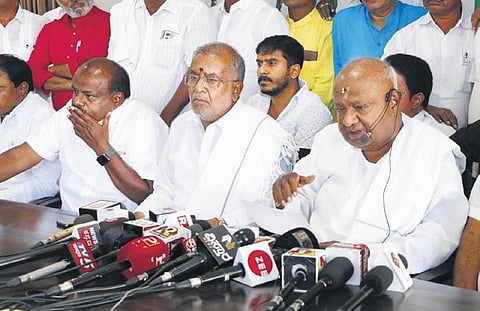

BENGALURU: JDS patriarch HD Deve Gowda has done it again -- by dissolving the state party unit, he has outmanoeuvred CM Ibrahim, who had claimed he was the original JDS man and the party’s state president. Ibrahim had thrown a challenge to the Gowda family with his claim that the party would not align with the BJP for the Lok Sabha elections.
According to political pundits, dissolution of the JDS is a shrewd but expected move -- if expelled from the party or state president’s post, Ibrahim would have a strong case to claim the president’s post and symbol. As national president, Gowda used his powers to save the party from possible division, observed an analyst.
Noted political scientist Dr Sandeep Shastry said it was an expected move by Gowda to try and control dissent, by saying Ibrahim has no locus standi in the party. “The ground has been prepared to prevent any dissent against the JDS leadership’s decision to go ahead with the alliance with the BJP,’’ he remarked.
“The fact is the JDS is more or less a family-controlled party, and those who tried to break their hold, including Siddaramaiah, have not been successful. It indicates the likely result of Ibrahim’s revolt too,” Shastry said.
It may be recalled that the former prime minister had got his political rivals expelled -- late chief minister Ramakrishna Hegde from the Janata Dal in 1996, and Chief Minister Siddaramaiah from the JDS in 2005 -- effectively shutting down dissent twice. When Gowda was prime minister, Hegde was dismissed from JD by then-national president Lalu Prasad Yadav. Following this, Hegde formed an apolitical forum, Rashtreeya Nava Nirmana Vedike, and went around the state, addressing public rallies. But he had to receive brickbats in the Vokkaliga bastion of Old Mysuru, including Mandya and Hassan.
Gowda expelled Siddaramaiah from the JDS after his relationship with him went sour over the chief minister’s post, which went to the Congress in the alliance government led by then CM N Dharam Singh. Siddaramaiah was upset that Gowda denied him the CM’s post, though then AICC president Sonia Gandhi was ready to offer it. A miffed Siddaramaiah launched AHINDA (acronym for minorities, backward classes and Dalits) to shape himself independently, and organised mega rallies in Kolar and Hubballi. That caught the attention of Gowda, who eventually got Siddaramaiah removed from the JDS.
Siddaramaiah, who hailed from the dominant Kuruba community, could emerge strong as he had already prepared the ground for his expulsion, and his appeal to the masses that Gowda had meted out injustice to him. A posse of leaders, including Ibrahim, quit the JDS and joined Siddaramaiah to tour the state.
It is interesting to see how Ibrahim claims justice for himself. He has already indicated that he will tour the state, including the Vokkaliga bastion of Mandya. “Gowda has not even groomed Vokkaliga leaders politically. How many houses do you (Gowda) want to destroy again?” he charged on Thursday.